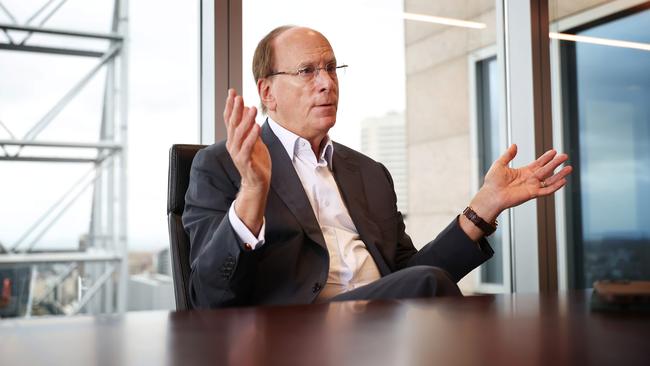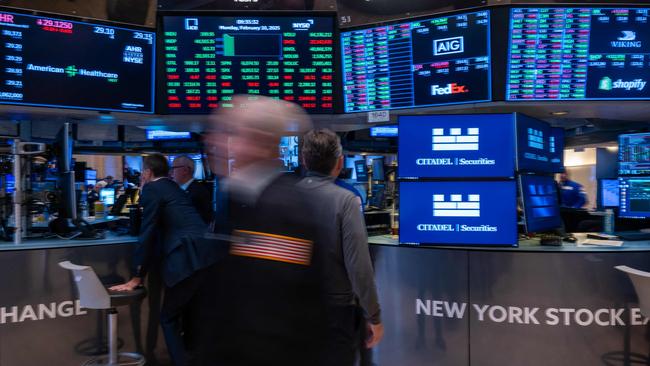The pendulum on corporate culture ‘swung too far left’: BlackRock’s Larry Fink
The most powerful investor on Wall Street tells The Australian that corporate culture is ‘undergoing a reset’ away from its progressive outlook. Larry Fink is moving with the times.

Business
Don't miss out on the headlines from Business. Followed categories will be added to My News.
Larry Fink, the head of the world’s biggest asset manager and one of the most powerful investors on Wall Street, has conceded the cultural pendulum for business has moved “way too far to the left” and is now rapidly moving in the other direction.
The comments by the head and founder of the New York-headquartered BlackRock, which has $US11.6 trillion ($18 trillion) under management, come as a new Trump administration in Washington is rapidly resetting corporate culture.
This includes aggressively rolling back regulation, doubling down on oil and gas drilling, while unwinding billions in former president Joe Biden’s renewable funding programs.
More recently in Trump’s sights have been corporate diversity targets, which have seen some on Wall Street stage a retreat from their plans.

Fink has generated ire in recent years for his views around ESG, making him a pin-up for all things “woke capitalism”. In particular he drew fire from some Republicans, and BlackRock was hit with lawsuits for urging companies the asset manager invests in to move quicker on tackling climate change.
Fink often used his lengthy annual letter to issue warnings, inferring BlackRock would be using its investor clout to drive a clean energy agenda.
However he began stepping away from that early last year, saying the green switch shouldn’t be at the cost of energy security.
Speaking to The Australian in Sydney, Fink said society was not static and was always shifting its outlook. His job was to move with the environment.
“The pendulum was very far left, and the pendulum is moving right. And it’s fine,” he said.
“Our job is to be working with society, working with government. Last year, we were awarded $US641bn in client money.
“Our job is to be working in any environment.
“Our job is to be working with both sides, and yes – as governments change, you can move from a more progressive view of life to a more conservative view of life, and it doesn’t change our responsibilities.
“This is what I have to remind everybody. Our job is to be focusing on 30-year outcomes for retirement. Our job is to be working on other issues. And so, yes, there is a change of environment.
“We’re going to adapt. We’re going to change.”
Underscoring the shift, BlackRock last month walked away from the Net Zero Asset Managers Alliance, a United Nations-backed initiative, citing rising legal threats. Several US banks including Morgan Stanley have also walked away from similar climate pledges around financing.
One area Fink is sticking by is diversity in the workplace. But he emphasises this is distinct from having quotas in the workplace.
The BlackRock boss said a US Supreme Court ruling nearly two years ago around ending affirmative action in college education effectively marked the end of quotas being used to promote gender or racial balance among US businesses.
“Every company has their own culture and how they describe diversity. At BlackRock, our view is we have to have a diverse workforce. And the number one element of diversity is diversity of mind so that we don’t have groupthink.
“We are very mindful in making sure that we have a completely diverse workforce … We’re trying to elevate everything. But I don’t have a quota.”
Populism inflation
The risk in politics or even across markets is rising populism, Fink says. This can be seen in driving support for Donald Trump and across Europe.
“Populism is inflationary because it’s all about fixing the moment. There’s nothing long term about populism, it’s the mood of a country. It’s a mood of an economy and this is why you have rising populism.”
BlackRock’s trillions are invested mostly in shares and bonds on behalf of big institutional clients and retail investors. The asset manager founded by Fink turbocharged its growth by doubling down on exchange-traded funds 15 years ago. This coincided with a rush of funds to this style of index-tracking fund investments, although that growth is now starting to slow.
In recent years, it has been making a bigger push into private credit, a fast-growing area that allows business borrowers to bypass traditional banking or debt markets. This sees BlackRock now moving into alternative asset space, going head to head with the likes of Blackstone and KKR.
Fink wouldn’t be drawn on whether markets were overheated, even as Wall Street hit its third record high so far this year. Last year the US share benchmark, the S&P 500, posted an annual gain of 23 per cent, driven by big tech names including Apple, Amazon and Nvidia.
The outlook depends on inflation, he says. But he remains bullish for the longer term.
“If inflation in the short run rallies, markets are going to be reset. But I would argue, and there’s that reset by, let’s say, 10 per cent, the long term trends are really positive,” he says.

He counts some of Australia’s biggest super funds as clients, including AustralianSuper and the Canberra-backed Future Fund. He’s just come off a series of back-to-back meetings with big investors here and says there’s a note of optimism. This is in contrast to Europe, where the feeling among big investors is one of “doom and gloom”. During a recent European roadshow he caught up with British Prime Minister Keir Starmer.
“I think there’s a basic calmness about Australia. Maybe that’s all relative to the noise from the US … and this feels pretty good here,” he said.
Fink has long held up Australia’s superannuation system as a model for the other countries to follow in helping to solve the puzzle of funding retirements. However, he says that even with the massive pools of patient capital the super funds sit on here, the conundrum with Australia is the challenge of making it easier for private money to invest in the necessary infrastructure.
“I think this is true in every part of the world, and with many economies where government deficits are growing. We need to find ways to use less fiscal stimulus and unlock more private capital.
“Much of these themes have been what President Trump is advocating. Let’s reduce regulation, let’s accelerate the permitting process. Let’s get moving.
“Australia and the United States have many similarities. We have excessive energy, and we have a poor power grid. How can that be? Both Australia and the United States have housing affordability issues. How can that be? So I think there’s quite a bit of similarities, and a lot of it in both cases is just underinvestment. If we unlock more private capital that’s going to create a lot of jobs and a lot of opportunities.”
Originally published as The pendulum on corporate culture ‘swung too far left’: BlackRock’s Larry Fink



